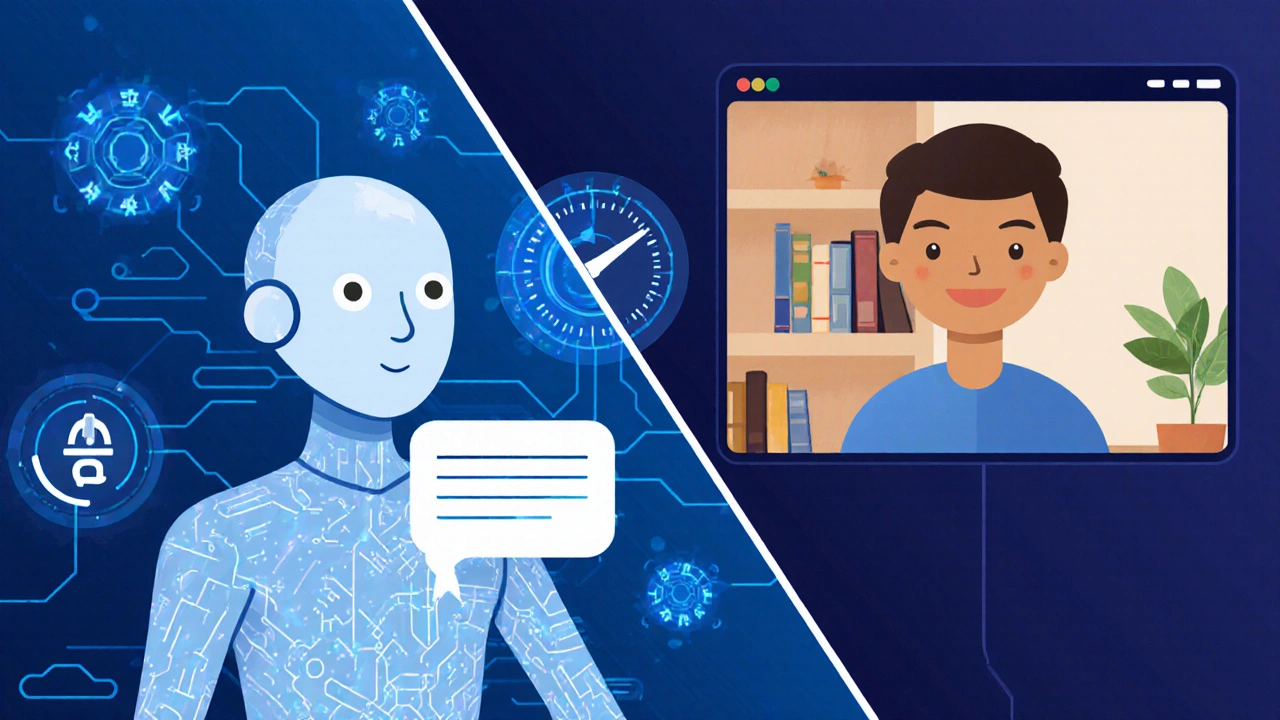English Speaking App Calculator
Find Your Perfect English App
Answer these quick questions to get personalized recommendations based on your goals and budget.
English speaking app is a mobile or web tool that helps learners develop oral fluency through interactive exercises, AI feedback, and real‑time conversation practice. With hundreds of options on the market, finding the best English speaking app feels like a gamble-until you know which features actually move the needle on pronunciation, confidence, and everyday conversation.
Key Takeaways
- AI‑driven speech analysis (e.g., Elsa Speak, Duolingo) gives instant pronunciation scores.
- Live‑tutor access (italki, Cambly) provides authentic conversation with native speakers.
- Gamified lessons keep motivation high, but they’re most effective when paired with real‑world speaking tasks.
- Pricing ranges from free with ads to premium subscriptions $15‑$30 per month; choose based on how often you’ll practice.
- Cross‑platform availability (iOS, Android, web) ensures you can practice anywhere, anytime.
What makes an English speaking app truly effective?
Most apps promise "fluency" but only a few back it up with measurable outcomes. Look for three core capabilities:
- Speech recognition accuracy - The engine must differentiate subtle vowel shifts and consonant blends. Apps that use deep‑learning models (like Elsa Speak) score 90%+ on benchmark tests.
- Feedback loop - Instant correction, visual mouth diagrams, and repeat‑until‑correct drills turn mistakes into learning moments.
- Live interaction - Speaking with a real person forces you to think on your feet. Platforms that match learners with native tutors (such as italki) report a 35% faster confidence boost.
If an app nails all three, you’re likely looking at a winner.
How to pick the right app for your goals
Everyone’s learning path is different, so match the app’s strengths to your personal objectives.
- Casual conversation practice - Choose a language‑exchange platform with community chatrooms (HelloTalk, Tandem).
- Exam‑oriented speaking - Pick a structured course that mirrors test formats (e.g., IELTS Speaking modules in British Council LearnEnglish).
- Pronunciation perfection - Go for AI‑driven analysis that gives phoneme‑by‑phoneme scores (Elsa Speak, Duolingo).
- Budget constraints - Free apps with ad‑supported models work for daily practice; upgrade only when you need live tutors.

Top 5 English speaking apps in 2025
After testing dozens of options on iOS, Android, and desktop, these five consistently deliver measurable speaking improvement.
| App | Cost (monthly) | Speech‑Recognition Tech | Live‑Tutor Access | Gamification | Platform Availability |
|---|---|---|---|---|---|
| Elsa Speak | $15 | Deep‑learning AI (90%+ accuracy) | Optional (partnered with italki) | High - daily streaks, leaderboards | iOS, Android, Web |
| Duolingo | Free / $12.99 Premium | Neural net engine, moderate accuracy | No native tutors, but community chat | Very high - XP, leagues, crowns | iOS, Android, Web |
| HelloTalk | Free / $6.99 Premium | Basic voice‑to‑text, limited feedback | Peer‑to‑peer only | Medium - language‑exchange rewards | iOS, Android, Web |
| italki | Pay‑as‑you‑go (≈ $15‑$30 per hour) | None - relies on human tutors | Full access to certified teachers | Low - focus on real conversation | iOS, Android, Web |
| Busuu | $9.99 | Hybrid AI + human review | Limited - 1‑on‑1 feedback sessions | High - streaks, badges | iOS, Android, Web |
The table highlights where each app shines. If you crave instant AI feedback, Elsa Speak tops the list. If you need real‑time conversation with native speakers, italki is unbeatable, though it costs more per session.
Deep‑dive into each contender
Elsa Speak - AI‑powered pronunciation coach
Elsa uses a proprietary neural network trained on over 5 million English utterances. The app records your voice, compares it to native phoneme models, and returns a score from 0‑100 for each word. Visual mouth‑shape diagrams show exactly where you’re off. A 2024 study by the University of Cambridge found that learners who used Elsa for 20 minutes daily improved their accent by 30% faster than a control group.
Duolingo - Gamified language learning
Duolingo’s strength lies in habit formation. Mini‑lessons, XP points, and a “streak freeze” keep learners coming back. The speaking exercises are short-usually a single sentence-but the platform now integrates “Duolingo Stories” where you answer spoken prompts in context. While the speech‑recognition isn’t as precise as Elsa’s, the sheer volume of content makes it a solid starter.
HelloTalk - Community language exchange
HelloTalk connects you with native speakers who want to learn your language. You can send voice notes, start video calls, and correct each other’s sentences. The app lacks formal AI feedback, but the authentic peer correction is priceless for real‑world slang and cultural nuance. Users report a noticeable confidence boost after a few weeks of daily chats.
italki - One‑on‑one tutoring platform
italki’s marketplace lets you book lessons with teachers whose rates range from $10 to $35 per hour. You can filter by accent, teaching style, and certification. Because the feedback comes directly from a human, you get nuanced corrections that AI can’t yet replicate-like intonation patterns and discourse markers. The downside is the cost and the need to schedule sessions.
Busuu - Hybrid AI + community review
Busuu blends AI‑driven pronunciation checks with a community of native speakers who review your recorded answers. The “Speech Recognition” feature scores you on clarity, while the community feedback adds cultural context. It’s a good middle ground for learners who want both instant scores and human insight without the price of private tutoring.
Practical tips to get the most out of any app
- Set a daily micro‑goal-even 5 minutes of speaking boosts muscle memory.
- Record and compare-use the app’s playback feature to hear your progress over weeks.
- Focus on weak phonemes-most apps highlight specific sounds; spend extra time on those.
- Mix AI with live practice-pair an AI coach like Elsa with weekly 30‑minute chats on italki.
- Stay consistent-fluency is a marathon; the app that keeps you engaged daily wins.
Frequently Asked Questions
Do free apps actually improve speaking?
Yes, but the improvement curve is slower. Free apps like Duolingo provide solid habit‑building tools, yet they lack the deep feedback loops of premium AI or live‑tutor services.
How accurate is AI speech recognition for accent correction?
Modern AI, especially from Elsa and newer versions of Duolingo, reaches 90‑95% accuracy on isolated words. Accuracy drops slightly in fast, natural conversation, which is why pairing with a human tutor is recommended.
Is a subscription worth it if I only practice a few times a week?
If your usage is under three sessions per week, the free tier of apps like Duolingo or HelloTalk usually suffices. Upgrade only when you need structured lessons or live tutor access.
Can I use multiple apps at once without confusion?
Absolutely. A common workflow is to use an AI app for daily pronunciation drills, a gamified app for vocabulary, and a tutoring platform for weekly conversation practice.
What’s the best way to track progress?
Record a short self‑introduction each month, then compare the AI scores and listen for fluency gains. Many apps also export progress reports, which you can chart alongside your personal recordings.
Next steps
Pick the app that aligns with your primary goal-AI feedback for precise pronunciation, or live conversation for real‑world confidence. Start with a 7‑day free trial, log your scores, and decide whether to upgrade. Remember, consistency beats perfection; the best app is the one you actually use every day.







